

Vol. 41 (Issue 15) Year 2020. Page 29
OGANEZOVA, Anna V. 1
Received: 23/01/2020 • Approved: 26/03/2020 • Published 30/04/2020
ABSTRACT: The results obtained through a sociological and content analysis showed that in Ukraine the employers' social responsibility for maintaining the health of the employees hasn’t been developed. Managers of industrial enterprises consider the proMethodology to apply Lean in supply chain managementtection of health of the employees as social protection, lies the responsibility for health foremost with the employees themselves. Managers act formally within the framework of the legislation. Employers rarely use health improvement programs for the employees, economize on work safety, increase working hours and work intensity. |
RESUMEN: Los resultados obtenidos a través de un análisis sociológico y de contenido mostraron que en Ucrania no se desarrolla la responsabilidad social de los empleadores para la protección de la salud de los empleados. Los ejecutivos de la industria creen que la salud de los empleados es protección social; La responsabilidad de la salud recae principalmente en los propios trabajadores. Los gerentes actúan formalmente en el marco de la legislación. Los empleadores rara vez usan programas de salud para empleados, ahorran en seguridad laboral, aumentan las horas de trabajo y la intensidad del trabajo. |
In Ukraine the problem of maintaining the health of the employees has become pressing against a background of growing rate of incidence, mortality and emergencies in some of its territories. Decrease in the level of economic activity of the population, drop in employment in basic sectors of the economy, increase in employment in the informal sector of the economy with mostly unskilled and low skilled labour force, increase in the level of hidden unemployment - all these processes have a negative impact on the health of the working population.
In terms of mortality Ukraine ranks the first in Europe and worldwide with a natural depopulation. The key role in the formation of low life expectancy in Ukraine is played by mortality rates of Ukrainian men aged 30-59 years, which are 4-6 times higher than in European Union countries (Levchuk, 2015). One third of the population are dying before the age of 65 (the end of employment period). Every employee has almost 1.5 illnesses, one in four has diseases of the circulatory system, one in five has respiratory organs diseases, more than 1.2 million people have diseases related to mental and behavioral disorders (Nagorna, 2018).
Adverse health effects are caused by working conditions. In Ukraine about one-third of employees work in conditions that do not meet the sanitary and hygiene standards: in 2017 the amount of such employees constituted 838.6 thousand people (or 28.4% of the total number of the employees) (Umovy pratsi pratsivnykiv u 2017 rotsi, 2018, p.7). This causes injuries and occupational diseases, which has a negative impact not only on the employees but also on the society as a whole: there is a decrease in labour productivity and an increase in the burden on the social security system, the economy of the country as a whole.
In terms of death rates at work Ukraine is a leading country among all EU countries and has the worst performance even in comparison with the countries of the Commonwealth of Independent States (CIS) (Fond sotsial'noho strakhuvannia Ukrainy, 2019). In total, from 2014 to 2017 the number of victims of industrial accidents constituted 18.2 thousand people, 1.4 thousand of whom died. (Travmatyzm na vyrobnytstvi v Ukraini u 2017 rotsi, 2018; p.9). There are more than 200 000 patients with occupational morbidity in the country. In 2015-2017 the number of disabled people, who were injured or had occupational disability, increased: from 1928 people in 2015 to 2365 people in 2017, despite the decrease in the number of people employed in the country (Sotsial'nyj zakhyst naselennia Ukrainy, 2016, p. .81; Sotsial'nyj zakhyst naselennia Ukrainy, 2018, p.82).
Experts have found that the economic losses of Ukraine as a result of occupational injuries and diseases constitute at least 60-70 billion UAH annually. (Tairova, 2016). These losses are caused by the termination of employment of a large number of employees through occupational diseases, disabilities or death at work. More than 300 000 people in the country are compensated for occupational injuries or diseases. About 1.14% of GDP is spent to eliminate the consequences of occupational diseases annually (Nagorna, 2018). For 9 months of 2019 the costs of the Social Security Fund for Temporary Disability amounted to over 7 billion UAH. (Fond sotsial'noho strakhuvannia Ukrainy, 2019). Costs of the enterprises caused by accidents in 2014-2017 amounted to more than 18 million UAH annually, including fines - more than 114 thousand UAH, and losses from property damages only (equipment, tools, destroyed buildings, structures) in 2017 amounted to 5 million UAH. (Travmatyzm na vyrobnytstvi v Ukraini u 2017 rotsi, 2018; p.28).
In the current circumstances the role of the employers in maintaining the health of employees is increasing. The justification of the need to involve business in ensuring the health of the employees was presented in the author’s work (Ohanezova, 2016b).
In Ukraine employers' focus on the employees' health is considered from the perspective of creating safe working conditions (Articles 13 and 47 of the Law on Occupational Safety). However, there is no responsibility (material, criminal, administrative) for violation of the law. At the same time according to experts " Ukrainian employers take care of the rate of profit more than of the life and health of the employees" (Ukraincy soznatel'no riskujut zdorov'em, bojas' poterjat' rabotu – jekspert, 2013).
According to the scientific research the issues of health protection of the employees are considered from the perspective of implementation of the principles of decent work and personnel safety (Kolot (Ed.), 2015; Brintseva, 2015), social responsibility in the field of the occupational safety and health (Shevchuk, 2012; Tsyna, 2013; Filipenko , 2015), risk mitigation in employment relations (Hrishnova, Mischuk & Olijnyk, 2014), formation of health culture, corporate health (Rybakov, 2015; Konovalova, 2018), workplace health management programs (Health Cost Containment and Efficiencies, 2010), workspace ecology (Tsaryk, Chernychenko & Chernysh, 2013; Karpovich, Lepihina, 2017), occupational health (Chen, 2015), employers' social responsibility (Chubarova, 2011; Mit’kina, 2012; Mosejko, 2012; Zemljanuhina, 2018).
According to the author, the category of "social responsibility of the employers" is the broadest and most comprehensive concept. Taking into account the health of the employees and the role of the employers in this process in Ukraine this concept gives the opportunity to use the most effective mechanisms to improve the situation. Therefore, all of these approaches can be expressed through the concept of the employer social responsibility, which is an integral part of corporate social responsibility. It is based on human rights in the labor and related fields, recognized throughout the world and documented by UN, ILO, WHO. This type of social responsibility is concentrated mostly in the international standard ISO 26000: 2010. International sustainable development documents define corporate social responsibility as the long-term commitment of the companies to act ethically and promote economic development while improving the quality of life of the employees, their families and society in general (Bobir’, 2013). Thus, the social responsibility of the employers to protect the health of employees is the obligation of the employer to behave ethically in terms of occupational and process safety, health care, the formation of environmentally friendly workplace, healthy lifestyles and to promote the accumulation of the health capital of the employees.
The purpose of the work: the article is devoted to the study of the state of the employers' social responsibility for maintaining the health of the employees in Ukraine.
The author focuses on the following tasks: to determine the employers’ attitude towards the employees' health; which health improvement practices are common among the employers.
The study was conducted in two phases:
Phase 1. sociological analysis (questionnaire survey of employers) according to the questionnaire developed by the author.
Phase 2: content analysis of the information resources, which reflect similar empirical research demonstrating employers' attitude towards employees’ health protection in Ukraine, as well as content analysis of corporate projects on health safety of the employees at enterprises, basing on open source data in Ukraine.
The author conducted a survey among employers of 20 medium and large enterprises with more than 251 employees occupied in the mechanic engineering industry in Kharkiv and Kharkiv region in March-May 2019. The reason for the choice of industrial enterprises was that the largest number of employees involved in this industry work with hazardous working conditions (57% as of December 31, 2017). The studied sample is not representative, but it reflects the characteristics of the studied (general) population and will allow to identify trends in the studied object - the attitude of the employers towards the issues of health protection of the employees.
The printed questionnaire was sent to the respondents by mail and sent to the e-mails of the enterprises. The employees of the Main Department of Statistics of Kharkiv provided assistance in conducting the survey. The questionnaire was drawn up in accordance with the purposes of the study, and it served to obtain only the information that solved the tasks of the study. The questionnaire included closed-ended questions of non-alternative type (menu-driven questions), i.e. a person could choose several answers from the offered options. 18 questionnaires were suitable for the further processing. The processed results are presented in the form of diagrams: the percentage of respondents, who answered a specific question, was calculated as a proportion of the total number of respondents. In order to eliminate the shortcomings of the questionnaire related to subjectivity, reliability, completeness of information, the author has combined the questionnaire survey with other methods of primary information gathering - content analysis (Phase 2). Methods of analysis, synthesis and generalization were also applied in the study.
3.1. Phase 1. Sociological analysis (questionnaire survey of employers) according to the questionnaire developed by the author
The following offers the results of the employers' survey regarding their attitude to the health protection of the employees in Kharkiv and Kharkiv region.
Figure 1 shows the opinions divided between the employers regarding the parties responsible for the employees’ health. Most employers think that the employees are responsible for their health, and less employers think that health authorities are responsible for the employees’ health. It should be noted that while most respondents believe that responsibility for the health is an employee's personal matter, more than half of the respondents do not decline their own responsibility.
Figure 1
Distribution of the respondents' answers to the question “Please, determine the party, who
is responsible for the employee's health”, %
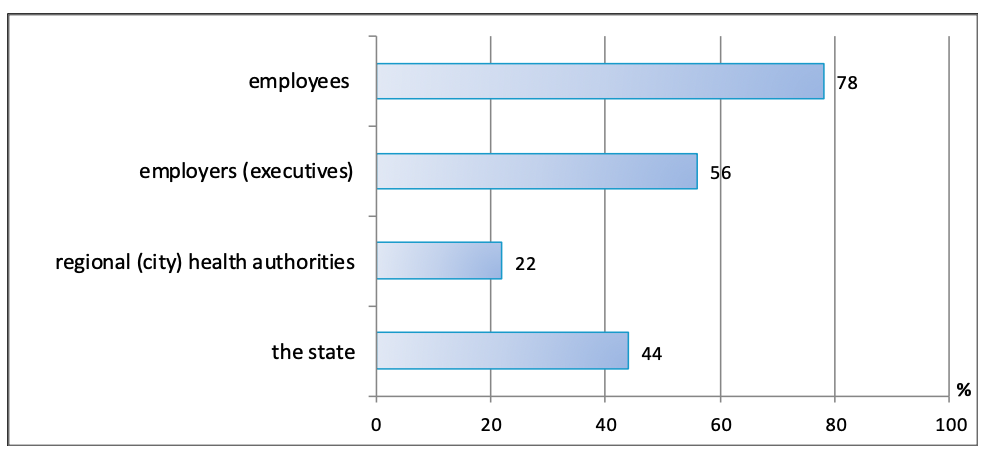
Employers were asked to determine the reason why it is necessary to care about the health of the employees. Most employers consider their employees' health concerns as social protection. Less executives think this is a way of generating competitive strengths (Figure 2). The result may be interpreted in the following way: the employers have prevailing Soviet-era approach to the protection of employees' health as an element of the social protection system; there is a lack of understanding of health as capital, a resource that cultivates the image and competitiveness of the enterprise.
Figure 2
Distribution of the respondents' answers to the question “What is the health care of the
employees of your enterprise needed for?”, %
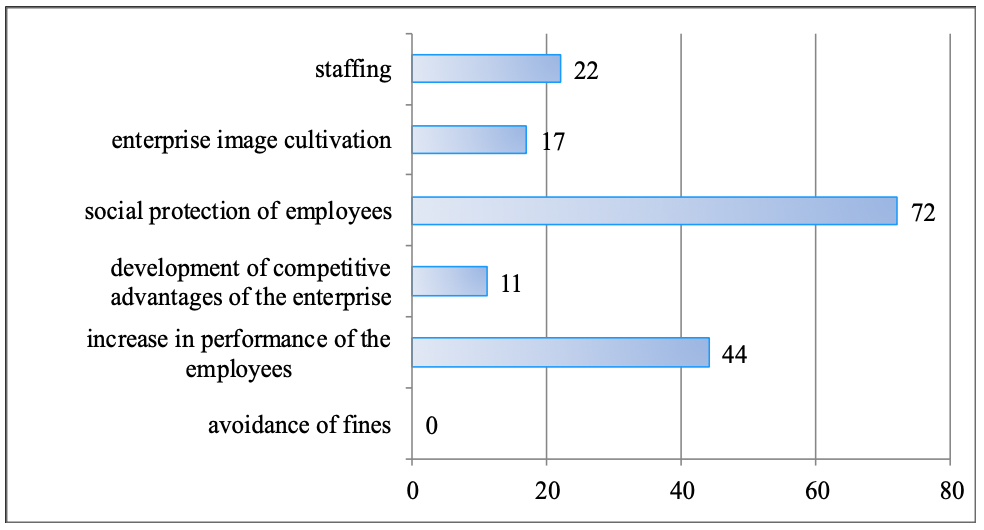
Most employers think that occupational health services shall be involved in the development of a strategy for the employees' health protection; less group thinks that the HR Department is responsible for this issue (Figure 3). Two thirds of the executives do not decline responsibility for the strategy development (66%). At the same time, their responses show the weakness of trade unions in solving the employee health issues.
Figure 3
Distribution of the respondents' answers to the question “Who should be involved in the
development of the enterprise health care strategy”, %
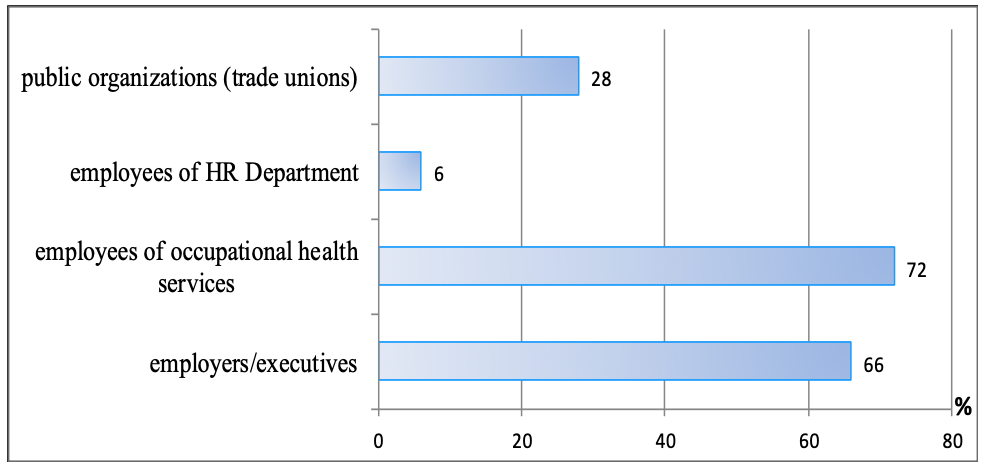
The employers were asked to indicate existing at the enterprise measures aimed at improvement of the health of the employees (Figure 4). The most common tool was the measure of “occupational safety training” and the least common was giving the incentives to the employees, who live a healthy lifestyle. It should be mentioned that no respondents indicated voluntary health insurance programs. To date, employers rarely apply the methods of giving incentives to the employees, who live a healthy lifestyle - only 6% of respondents encourage employees with healthy living; one fifth (22%) - implement activities aimed at forming a healthy lifestyle (group competitions, attending gyms, swimming pools, etc.). At 7 enterprises (39%) there are still healthcare services (health units, health centers).
Figure 4
Distribution of the respondents' answers to the question “Please, tick which of the
proposed measures are implemented at your enterprise for improvement of the employees’ health”, %
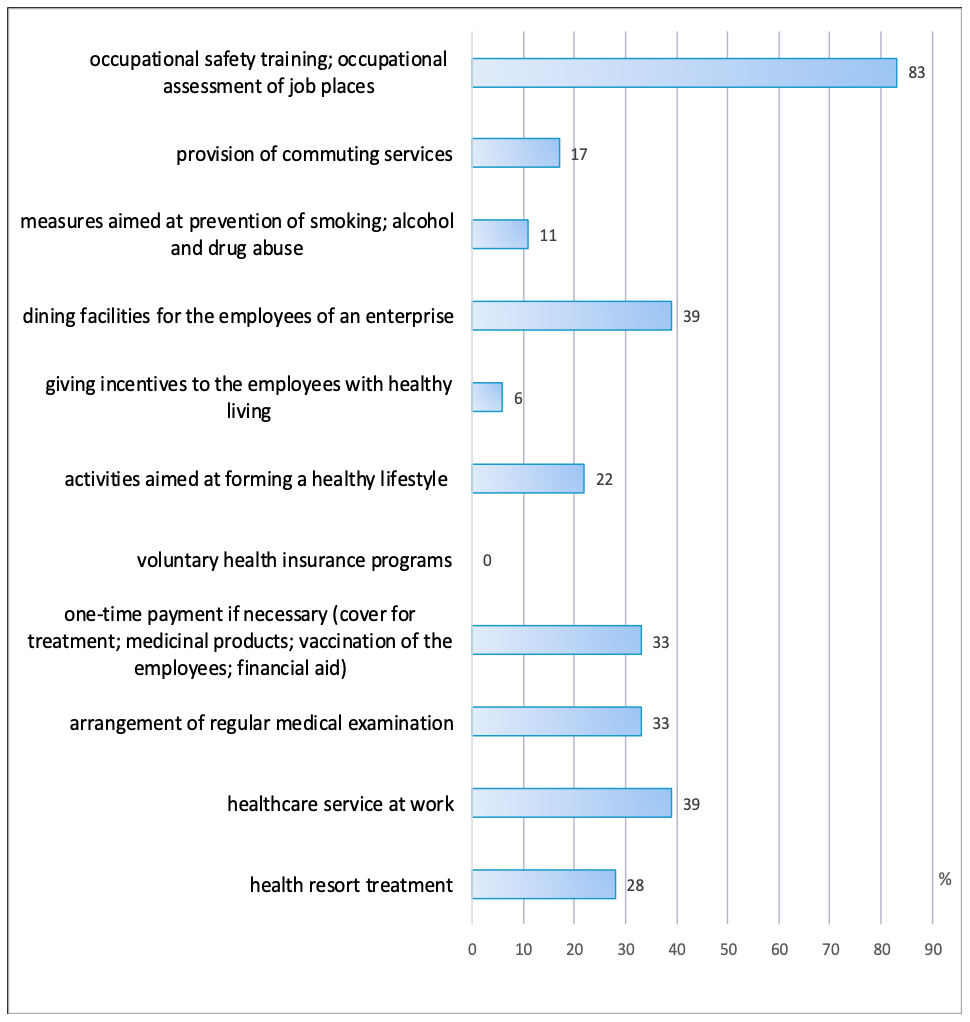
According to the most executives’ answers the preventative and health protection measures, which are carried out at the enterprise, comply with the legislation; less executives indicate that these measures are carried out whenever necessary (Figure 5).
Figure 5
Distribution of the respondents' answers to the question “How are the preventative and
health protection measures carried out at the enterprise”, %
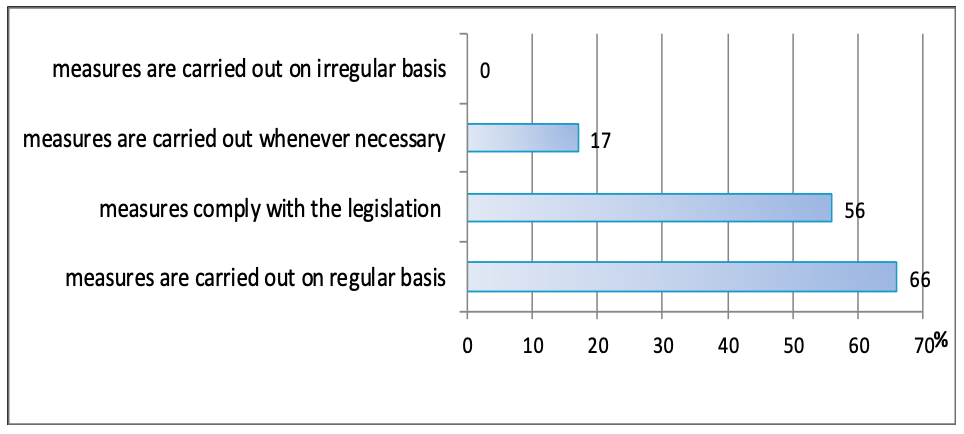
Respondents indicated that the most preferable form of additional investments in health care of the employees is one-time payment in case of an employee's illness (which is quite justified by expensive medical care in the country), and the least preferable form is the opening of their own medical office (Figure 6).
Figure 6
Distribution of the respondents' answers to the question “What forms of additional
investment in employee health care would be most applicable for you?”, %
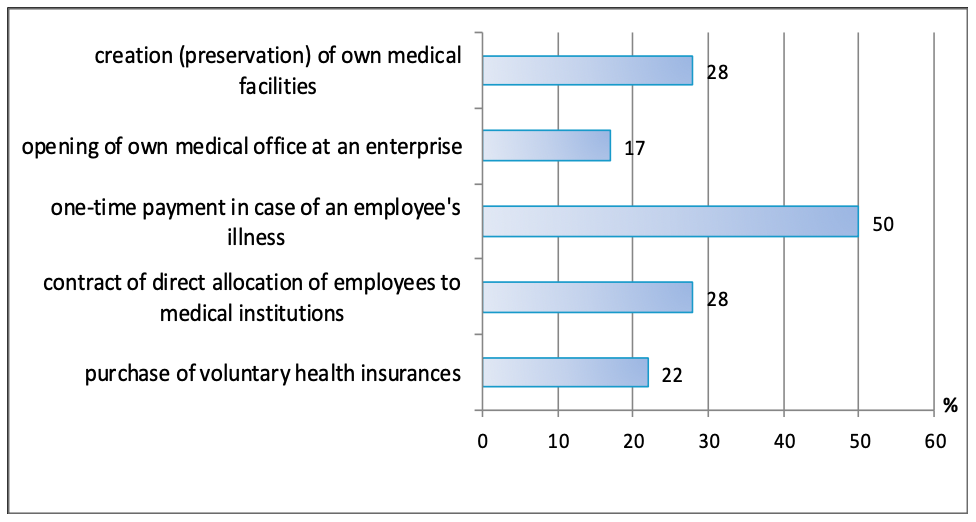
Figure 7 shows that the employers have different opinions on the possibility of introducing of compulsory contributions for the health insurance. Most employers consider the introduction of compulsory contributions for the health insurance as care for the health of the employees; less employees consider them as a way of implementation the responsibility of the enterprise for the health of the employee.
Figure 7
Distribution of the respondents' answers to the question “How do you consider the possible
introduction of a compulsory contribution for health insurance?”, %
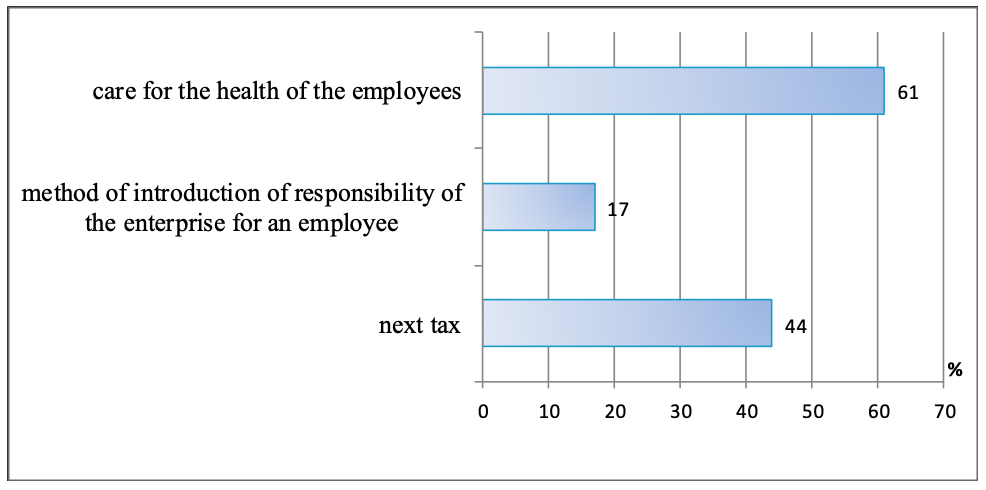
In 2019 most employers did not plan to reduce healthcare expenditures for the employees (72% of respondents), more than a fifth of respondents (22%) planned to increase those expenditures compared to the previous year, at 6% of the enterprises financing measures depend on the profit (Figure 8).
Figure 8
Distribution of the respondents' answers to the question “What is the projection of your
enterprise for budgeting the employee healthcare in 2019?”, %
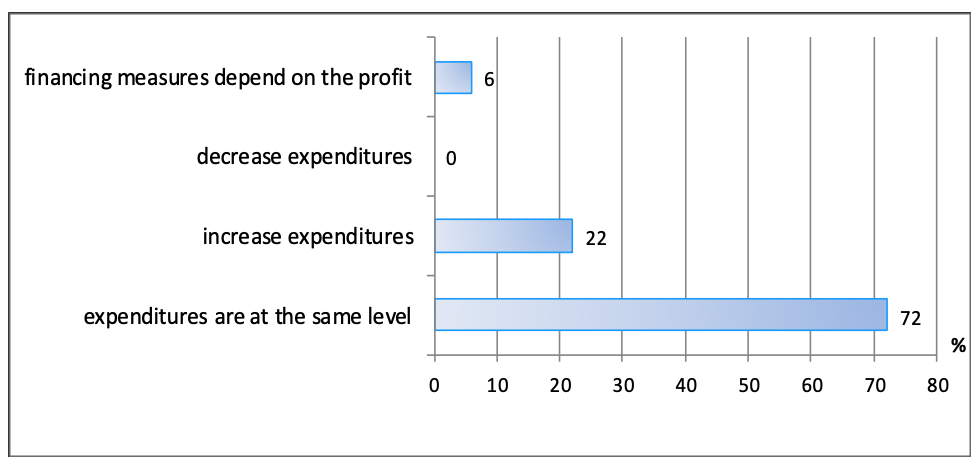
Respondents were also asked to rate the priority of measures that would increase employers' responsibility for employee health (Figure 9). Among the priorities the employers have indicated an increase in contributions for the occupational safety and health sector and running an extensive campaign on social responsibility awareness. The least prioritized were the following measures: strengthened inspection of supervisory authorities and push from trade unions.
Figure 9
Distribution of the respondents' answers to the question “What measures will
increase the responsibility of the employers for the health of the employees?”, %
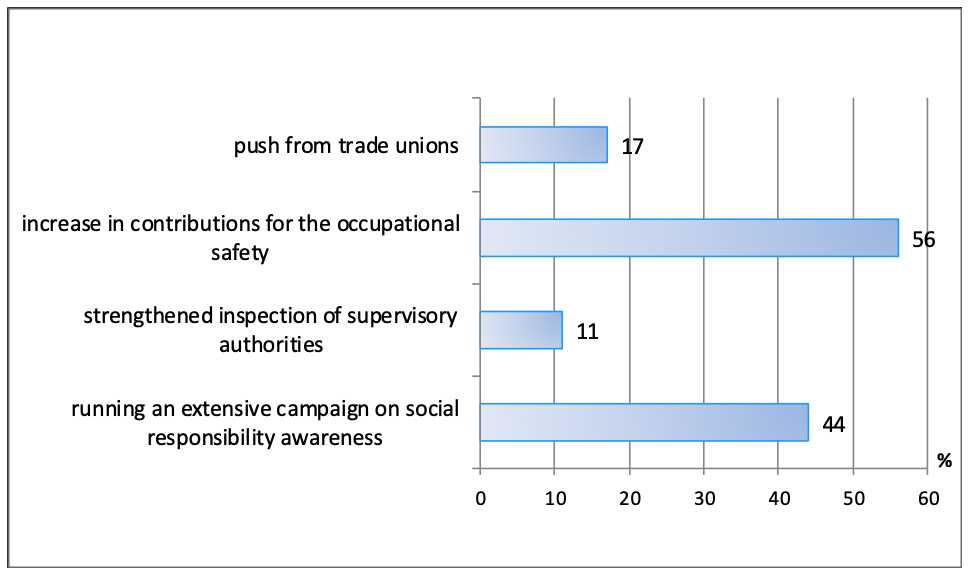
Figure 10 shows how different the employers' opinions are on the main obstacles to
the implementation of social responsibility for maintaining the health of the employees. Most employers indicated the imperfection of the legal framework, and less employers indicated the lack of state support.
Figure 10
Distribution of the respondents' answers to the question “What are the main obstacles to
the implementation of the social responsibility of the employers to protect the health of
the employees?”, %

2.1. Phase 2. Content analysis of information resources, which reflect research findings demonstrating employers' attitudes towards the employee health protection in Ukraine, as well as content analysis of corporate projects on health safety of the employees at enterprises, basing on the open source data in Ukraine.
The results of this phase are presented in Tables 1 and 2.
Table 1
The findings of the studies reflecting the social responsibility of the employers for
maintaining the health of the employees in Ukraine
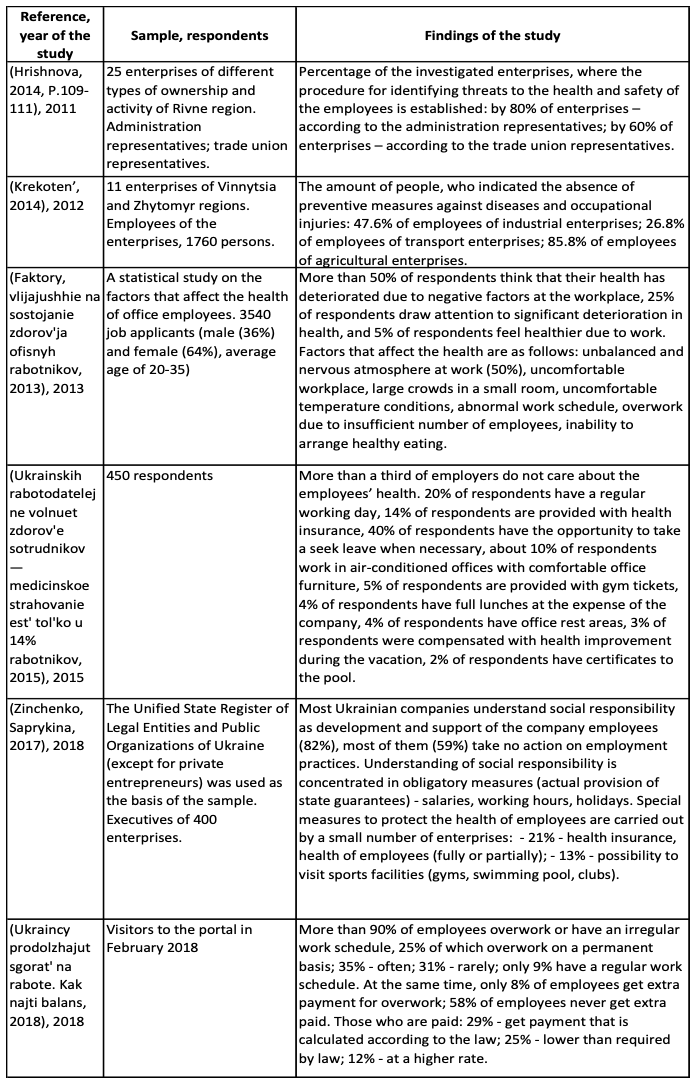
Table 2
Analysis of corporate projects for maintaining the health of the employees at enterprises
basing on open source data in Ukraine
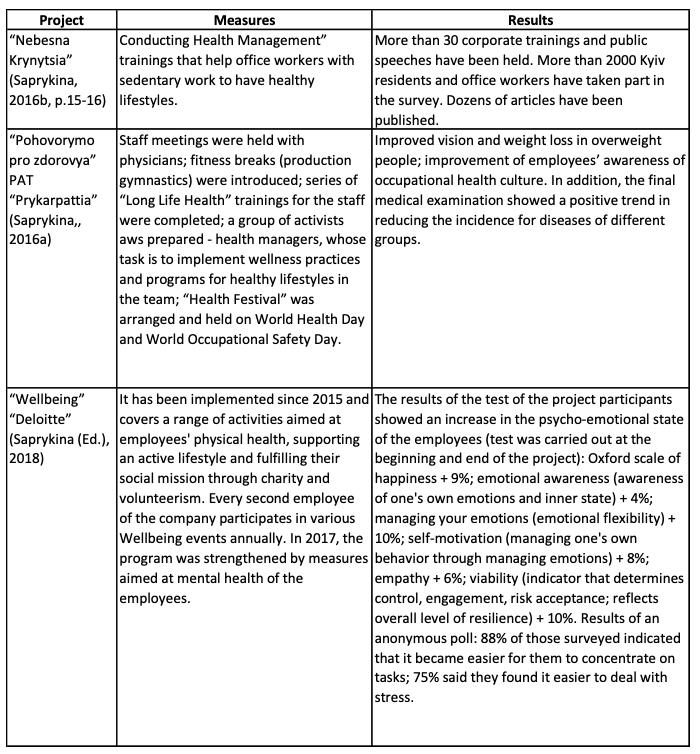
The author’s research includes the following findings:
- executives of Kharkiv enterprises do not recognize their participation in and contribution to solving the health problems in terms of social responsibility. This may be due to the fact that they have Soviet experience of safe job management, therefore protection of the employees' health is associated with social protection more than with social responsibility;
- the enterprises are subjects of health protection of the employees and operate within the framework of the legislation: they pay compensation for harmful working conditions, seek vacations, conduct training in occupational safety, certification of workplaces (however, according to the author, these actions are ineffective: enterprises expenditures for disease prevention, occupational safety and health, healthy rest and medical services are minimal; safety training, medical examinations are conducted formally, etc. (Ohanezova, 2016a);
- the responsibility for health is primarily the responsibility of the employees, but some employers do not decline their own responsibility; trade unions have little impact on the health and safety of the enterprises;
- Kharkiv enterprises (as well as enterprises in Ukraine as a whole) did not receive the proper promotion of health improvement programs (such as annual dispensary, vaccination, hot meals, establishment of their own health centers, partial or full payment for health resorts; rest homes, children's camps, participation in sports competitions). Most of these measures are very rare in the practice of Ukrainian enterprises, although the need for them is obvious;
- respondents, as hindrance to the development of social responsibility for the health protection of the employees, recognized the imperfection of the legislation, lack of state support, lack of funds, tax burden (according to the opinions of more than 50% of the respondents).
In general, the social responsibility of the employers for protection of the employees’ health has not been properly developed in Ukraine (Table 1). Employers, taking into account the interests of business profitability, do not care about the health of their employees (economize on occupational safety, increase working hours, work intensity, etc.). In the country a small number of enterprises use employee health improvement programs (Table 2).
Under the current circumstances the health of the employees in Ukraine is critical, it is necessary to apply measures of external influence on the employers in order to increase their responsibility for the health of their employees. This can be implemented by means of institutionalization of social responsibility of the employers.
Bobyr', O.I. (2013). Kontseptsii korporatyvnoi vidpovidal'nosti v stratehiiakh mizhnarodnoho menedzhmentu [Corporate responsibility concepts in international management strategies]. Biznes-navihator – Business Navigator, 1(30), 224–230. [in Ukrainian]
Brintseva, O. H. (2015). Rozshyrennia mozhlyvostej vidtvorennia trudovoho potentsialu pidpryiemstv Ukrainy v konteksti pryntsypiv hidnoi pratsi. Sotsial'no-trudovi vidnosyny: teoriia i praktyka – Social and Labor Relations: Theory and Practice, Kyiv: KNEU, 2, 162-168. [in Ukrainian]
Chen, L. (2015). Perceived workplace health support is associated with employee productivity. American Journal of Health Promotion, 29(3), 139–146. Retrieved from https://www.ncbi.nlm.nih.gov/pubmed/25559250 DOI: 10.4278/ajhp.131216-QUAN-645
Chubarova T.V. (2011). Social'naja otvetstvennost' v rynochnoj jekonomike: rabotnik, biznes, gosudarstvo. SP.: Nestor istorija. [in Russian].
Faktory, vlijajushhie na sostojanie zdorov'ja ofisnyh rabotnikov. (2013). Retrieved from http://www.jobhunter.ru/whatsnew/20130925.htm [in Russian].
Filipenko, A.S. (2015). Okhorona pratsi iak ob'iekt sotsial'noi vidpovidal'nosti. Naukovyj visnyk Khersons'koho derzhavnoho universytetu. Seriia : Yurydychni nauky – Scientific Bulletin of Kherson State University. Series: Law., 6(2). 135-138. Retrieved from http://nbuv.gov.ua/UJRN/ [in Ukrainian].
Fond sotsial'noho strakhuvannia Ukrainy. (2019). Nadannia material'noho zabezpechennia zastrakhovanym osobam ta provedennia strakhovykh vyplat poterpilym na vyrobnytstvi (chlenam ikh simej) za 9 misiatsiv 2019 roku. Retrieved from http://www.fssu.gov.ua/fse/control/main/uk/publish/article/951723 [in Ukrainian].
Health Cost Containment and Efficiencies. NCSL Briefs for State Legislators. 2010 October; 13. Retrieved from: http://www.ncsl.org/documents/health/IntroandBriefsCC-16.pdf
Hrishnova, O.A., Mischuk H.Yu., Olijnyk O.O. (2014). Sotsial'na vidpovidal'nist' u trudovykh vidnosynakh: teoriia, praktyka, rehuliuvannia ryzykiv. Rivne: NUVHP. [in Ukrainian].
Karpovich, Ju.V., Lepihina, T.L. (2017). Vlijanie jekologii rabochego prostranstva na ustojchivoe razvitie cherez zdorov'esberezhenie personala predprijatija. Vestik Volgogradskogo gosudarstvennogo universiteta – Vestik of Volgograd State University, 1 (38), 122-133. Retrieved from https://doi.org/10.15688/jvolsu3.2017.1.14 [in Russian].
Kolot, A. M. (2015) (Ed.). Sotsial'na vidpovidal'nist'. Kyiv: KNEU. [in Ukrainian].
Konovalova, V. G. (2018) Opyt, tendencii razvitija i problemy realizacii korporativnyh programm upravlenija zdorov'em i blagopoluchiem personala. Upravlenie personalom i intellektual'nymi resursami v Rossii – Human Resources and Intellectual Resource Management in Russia, 7(5), 19-29. [in Russian].
Krekoten', O.M. (2014). Sub'iektyvna otsinka stanu zdorov'ia pratsivnykamy providnykh haluzej ekonomiky. Visnyk sotsial'noi hihiieny ta orhanizatsii okhorony zdorov'ia Ukrainy – Bulletin of Social Hygiene and Health Organization of Ukraine, 3(61), 72-78. [in Ukrainian].
Levchuk, N. (2015). Prodolzhitel'nost' zhizni ukraincev: naskol'ko i pochemu my otstaem. Novoe vremja – New time. Retrieved from http://nv.ua/opinion/levchuk/prodolzhitelnost-zhizni-ukraincev-naskolko-i-pochemu-my-otstaem--51138.html [in Russian].
Mit'kina, V.V. (2012). Social'naja otvetstvennost' rabotodatelja za zdorov'e naemnyh rabotnikov promyshlennyh predprijatij. Abstracts of Papers '12: Sociologija i obshhestvo: global'nye vyzovy i regional'noe razvitie (pp. 4396-4400). Moskva. [in Russian].
Mosejko, E.E. (2012). Institucializacija kapitala zdorov'ja kak sistemy ego otnoshenij po povodu ego vosproizvodstva. Biznes, obrazovanie, pravo. Vestnik Volgogradskogo instituta biznesa – Business, education, law. Bulletin of the Volgograd Institute of Business, 3(20), 44-49. [in Russian].
Nahorna, A. M. (2018). Medyko-sotsial'ni ta demohrafichni determinanty formuvannia trudovoho potentsialu v Ukraini. Ukrains'kyj zhurnal z problem medytsyny pratsi – Ukrainian Journal of Occupational Health, 2(55), 3-19. [in Ukrainian].
Ohanezova, A. V. (2016a). Napriamy derzhavnoho rehuliuvannia zberezhennia zdorov'ia pratsiuiuchoho naselennia v Ukraini. Biznes-inform – Business Inform, 2016, 10, 236-243. [in Ukrainian].
Ohanezova, A. V. (2016v). Sotsial'na vidpovidal'nist' robotodavtsiv iak osnova zberezhennia zdorov'ia pratsiuiuchoho naselennia. Problemy ekonomiky – Problems of Economics, 2, 173–178. [in Ukrainian].
Rybakov, I.A. (2015). Korporativnoe zdorov'e kak chast' korporativnoj kul'tury. Upravlenie korporativnoj kul'turoj, 01(25), 40-44. [in Russian].
Saprykina M.A. (2016a) (Ed.). Praktyky KSV v Ukraini 2015 (red.). Tsentr "Rozvytok KSV". Kyiv. [in Ukrainian].
Saprykina M.A. (2016b) (Ed.). Praktyky KSV v Ukraini 2016. Tsentr "Rozvytok KSV". Kyiv. [in Ukrainian].
Saprykina M.A. (2018) (Ed.). Praktyky KSV v Ukraini 2017. Tsentr "Rozvytok KSV". Kyiv. [in Ukrainian].
Shevchuk, A. A., Majak T. N. (2012). Social'naja otvetstvennost' – perspektiva razvitija obshhestvennogo proizvodstva. Aktual'nye problemy arhitektury, stroitel'stva i jenergosberezhenija – Actual problems of architecture, construction and energy conservation, 4, 446-450. [in Russian].
Sotsial'nyj zakhyst naselennia Ukrainy: Statystychnyj zbirnyk. (2016). Derzhavna sluzhba statystyky Ukrainy. [in Ukrainian].
Sotsial'nyj zakhyst naselennia Ukrainy: Statystychnyj zbirnyk. (2018). Derzhavna sluzhba statystyky Ukrainy. [in Ukrainian].
Tairova, T. M. (2016). Problemni pytannia okhorony pratsi v Ukraini. Problemy okhorony pratsi v Ukraini – Labor Protection Problems in Ukraine, 32, 3-15. Retrieved from http://nbuv.gov.ua/UJRN/pop_2016_32_3 [in Ukrainian].
Travmatyzm na vyrobnytstvi v Ukraini u 2017 rotsi. Statystychnyj zbirnyk. (2018). Derzhavna sluzhba statystyky Ukrainy, Kyiv. [in Ukrainian].
Tsaryk, I.M., Chernychenko, O.I., Chernysh, N.M. (2013). Kryterii ta napriamy analizu efektyvnosti orhanizatsii robochoho mistsia. Visnyk Chernihivs'koho derzhavnoho tekhnolohichnoho universytetu – Bulletin of Chernihiv State Technological University, 1(64), 38-43. [in Ukrainian].
Tsyna, A. Yu. (2013). Shliakhy zabezpechennia okhorony pratsi v strukturi sotsial'noi vidpovidal'nosti. Problemy okhorony pratsi v Ukraini – Labor Protection Problems in Ukraine, 26, 109-118.
Ukraincy prodolzhajut sgorat' na rabote. Kak najti balans. (2018). Retrieved from https://korrespondent.net/lifestyle/health/3983201-ukrayntsy-prodolzhauit-shorat-na-rabote-kak-naity-balans [in Russian].
Ukraincy soznatel'no riskujut zdorov'em, bojas' poterjat' rabotu – jekspert. (2013). Retrieved from https://tsn.ua/ru/zdorovya/ukraincy-soznatelno-riskuyut-zdorovem-boyas-poteryat-rabotu-ekspert-309668.html [in Russian].
Ukrainskih rabotodatelej ne volnuet zdorov'e sotrudnikov — medicinskoe strahovanie est' tol'ko u 14% rabotnikov. (2015). Retrieved from https://forinsurer.com/news/15/08/20/32837 [in Russian].
Umovy pratsi pratsivnykiv u 2017 rotsi. Statystychnyj zbirnyk. (2018). Derzhavna sluzhba statystyky Ukrainy, Kyiv.
Zemljanuhina, N.S. (2018). Obespechenie zdorov'ja rabotnikov – neobhodimyj jelement korporativnoj social'noj otvetstvennosti v Rossii. Strategii biznesa – Business Strategies, 3 (47), 03-06. Retrieved from: https: www.strategybusiness. ru/jour/issue/view/47/showToc [in Russian].
Zinchenko A., Saprykina M. (2017). Rozvytok KSV v Ukraini: 2010-2018. Kyiv: Vydavnytstvo «Yuston». [in Ukrainian].
1. PhD (Economics), Associate Professor, Kharkiv Medical Academy of Postgraduate Education, Ukraine; e-mail: av.oganezova@gmail.com
[Index]
revistaespacios.com

This work is under a Creative Commons Attribution-
NonCommercial 4.0 International License